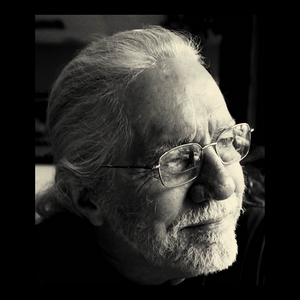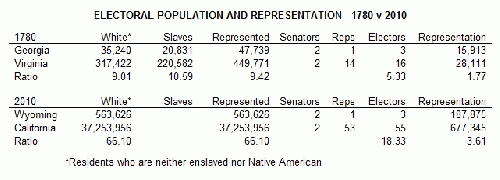How did the Founders intend to achieve the protection of minorities in the new republic? Let's first define their view of minorities and citizenship. Minorities whose rights were to be protected were clearly not the slaves, Indians, or women of the day. No, the minorities were the small states. This is more easily understood by recognizing the federal government as an aggregation of states rather than an aggregation of people - the states, after all, were the sovereign entities in 1787. Furthermore, the delegates to the constitutional conventions were representatives of their states' interests rather than the overall interests of the citizens within their states.
Small states achieved a degree of protection from large states through the composition of Congress. Recognizing that the smallest states would enjoy numerically inferior representation in the House of Representatives, they required numerically equal representation in the Senate. The apportionment of electors followed the apportionment of total representation in both houses of Congress. The effect* was to ensure more equal treatment of small states while ensuring much greater weight for the citizens of small states. For example, consider this contrast as illustrated in the table below: the largest state, Virginia, would enjoy sixteen electors, and 28,000 people were needed for each elector to cast a vote; the smallest state, Georgia, would have only three electors, but fewer than 16,000 people were needed each elector to cast a vote. This gave Georgia voters a voice that was about 77% louder than the voice of Virginia voters in the election of 1788! This makes sense only if we recognize that the Founders did not view people as voters - no, voters were the states and their designated representatives.
The Founders who framed the Constitution were known as Federalists. Their contemporaries who preferred merely a list of mutual protections among the States were known as Anti-Federalists [5] - and their influence brought about the Bill of Rights. Some say that these were political parties, but they bore little resemblance to what blossomed just a few years later. The virtual absence of political parties in 1780 is instructive. Nowhere in the Constitution do political parties appear, nor do rules and procedures for their primaries. The Founders could not have intended a virtual shadow government to evolve in parallel with - but outside of - federal authority and the authority of the States.
The dysfunctional relationship between President John Adams and Vice President Jefferson was instructive, and the Twelfth Amendment prescribed that each state would submit two lists - one for President and one for Vice President. Amazingly, the Congress and the States regarded their own literal intent quite flexibly, altering its directions in a short five years!
LIMITATIONS OF THE FRAMERS
Did the Founders ever intend one-man-one-vote? Place yourself in the late eighteenth century. Only six states selected electors by anything like a popular vote in the first presidential election, and voting qualifications varied widely. In other states, the legislatures selected electors, and some states so badly fumbled the process that they were unrepresented in the college. And if states were in disarray, they - as voting entities - were certainly better organized that the populace at large. This was a very new republic with untried polling structures and processes. This was a world in which a direct popular vote was simply not a possibility.
Starting with the advent of the Democratic Republican Party in 1790 and its growing antipathy with the Federalists, the institutions of government as envisioned by the Founders were corrupted. A layer of partisan political power and influence began to shape policies in the legislative and executive branches of the federal government. This added layer represented neither the states nor the individual citizens of the new Republic, but tended to serve collections of special interests - political parties - that transcended borders and demographics.
If the rights of small states were protected in 1787 by disproportionate popular representation in the Electoral College, the founders could not have foreseen the consequences of even greater disparities that would develop in the future. We have seen that voters in the smallest state enjoyed a voice 77% louder than those in the largest state in the 1788 election. The Founders would be amazed to learn that, in the election of 2016, voters in the smallest state enjoyed a voice 261% louder than those in the largest state! [6]
WINNERS AND LOSERS
Ruth Bader Ginsberg recently remarked, "There are some things I would like to change. One is the Electoral College, but that would require a constitutional amendment and amending our Constitution is a powerfully hard thing to do." Knowing Ginsberg's values is our first clue to who would gain from the elimination of this archaic institution.
The Electoral College guarantees the perpetuation of the two-party system that the Framers so obviously eschewed. The added layer of partisan power fostered by the indirect vote found its own interests to be served by the college itself. Concentrating the political power within a state, in turn, serves the interests of the majority party - who usually command all of the electors - while ignoring the interests of all minorities. No meaningful challenge can be mustered without concentrating all remaining political power into the party of opposition. A system that violates minority rights and stifles diversity makes losers of anybody who is different, or whose views are creatively divergent.
The Electoral College guarantees that the zone of meaningful competition in a presidential election is very narrow. Many states are politically and culturally predestined to the domination of one party. In the 2016 election, for example, the electors from Massachusetts and California would inevitably cast their ballots for the Democratic candidate; the electors of the Confederate States would inevitably cast their ballots for the Republican candidate. This means that policy positions, campaign rhetoric, and money can be targeted to a few swing states in which political power is divided more equally. And the issues important in Ohio or Colorado may not be those that are most critical to the country as a whole. In such a system, the interests of an overwhelming majority of Americans are ignored entirely.
Because the zone of meaningful competition is narrowed by the Electoral College, the corruptive powers of big-money interests can be more efficiently focused. The ideal of ideas, political power, and monetary support percolating up from the grass roots of local communities can be overwhelmed by enormous, remotely-funded campaigns narrowly targeted to particular states, counties, and even precincts. We all lose when such corruption is facilitated by the very system that is supposed to protect us.
The Electoral College system effectively disenfranchises a majority of voters. The ballots of Republicans in California and Massachusetts are as meaningless as the ballots of Democrats in South Carolina and Alabama. Unless you are among those voters who live in a swing state, your ballot simply does not count - you have been disenfranchised! And you are not the only loser; a nation that tolerates the selection of its Executive Branch by a minority of its citizens has edged one step closer to tyranny.
A half-century ago, a movement to eliminate the Electoral College was alive and well - but so was the opposition, who at the time considered themselves among the minority. Those who successfully defended the electoral status quo actually cited the vulnerability of their beloved two-party system to the perceived threat of a direct popular vote. Also among their originalist arguments - and presaging today's war on science - was an attack on the legitimacy of numerical majorities. "Nothing could be clearer in the Framers' thought than their rejection of a merely numerical concept of representative government. If the Constitution stands for nothing else, it stands for the idea that mere numbers have no capacity to make legitimate that which is otherwise illegitimate--whether those numbers be 51 or 90 percent of the whole." [7] In effect, the defenders of the college are saying that their interpretation of the Founders' intentions carries more weight than a 90-percent majority!
(Note: You can view every article as one long page if you sign up as an Advocate Member, or higher).





